Last time I looked at the popularity of chess amongst the residents of the Star and Garter Home for Disabled Ex-Servicemen in Richmond in the 1930s.
Richmond wasn’t the only place in which those with physical handicaps were encouraged to play chess. It’s time to return to the city of Leicester, which, you may recall, was my father’s home city, and also where I studied between 1968 and 1972. In fact my parents’ families were both from the Midlands, crisscrossing the counties of Warwickshire, Leicestershire and Northamptonshire, and occasionally bumping into each other in places like Coventry and Leicester.
The Leicester Guild of Cripples was founded in 1898, providing services for the physically handicapped of the city. Between 1925 and 1991 they ran a holiday home in the nearby village of Cropston. Of course, along with other terms for disabilities which became playground insults, we can no longer use the word ‘cripple’ in that context today. They later became the Leicester Guild of the Physically Handicapped and in 2000 changed their name to MOSAIC 1898 where they now cater for those with a wider range of disabilities.
You can visit their website here and watch a 1934 home movie about the Guild here.
We’ll now turn the clock back to 1930 and meet a remarkable man named Leonard Inskip. Leonard, born in 1885 was one of a large family. His father, William John Inskip, was an influential trade unionist working, like very many in Leicester, in the bootmaking trade. He became a local councillor, alderman and magistrate, but was also antisemitic, campaigning against Jewish shoemakers. He merits a Wikipedia page here, and you can also read about him on Ned Newitt’s essential The Who’s Who of Radical Leicester website here.
Leonard, despite his physical handicap, was an enterprising chap. In 1930 he founded a magazine called The Cripples’ Journal, and sent copies of the first issue to newspapers up and down the country.
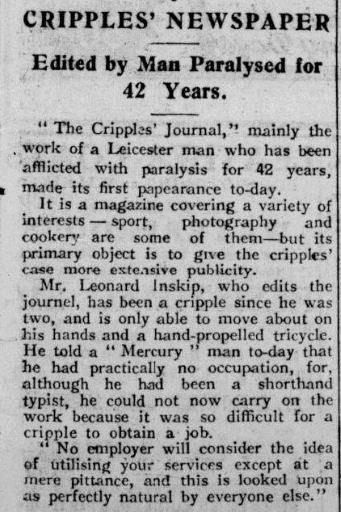
Biddulph Street, to the east of the city centre, has been split into four sections with different names so it’s not possible to identify the exact house where Leonard lived, but it would probably have been somewhere around here. A completely different world from the suburban mansions where you’d find the civil servants, bankers and insurance executives who played chess in leafy Richmond and Twickenham.
Leonard had a particular interest in sports, and just like the residents of the Star and Garter, believed that those who weren’t able to access physical sports should be encouraged to take part in mental sports.
He therefore wrote to the local paper suggesting a social club where he and his fellow guild members could play friendly games of draughts, chess and billiards against members of other social clubs in the city.
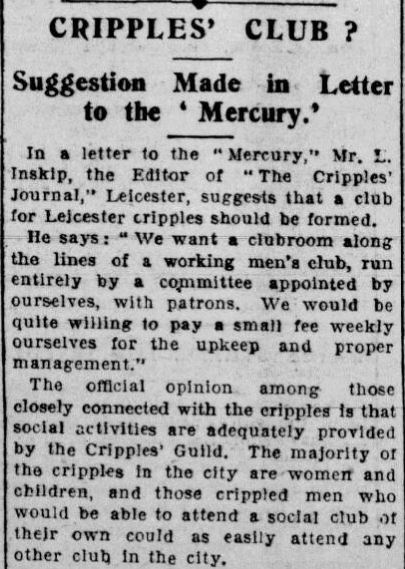
The authorities, as you see, weren’t sympathetic. Most of the cripples were women and children and the men, if they wanted, could go and join another club. However, Leonard received letters of support, and it wasn’t long before the Cripples Guild played their first chess match.
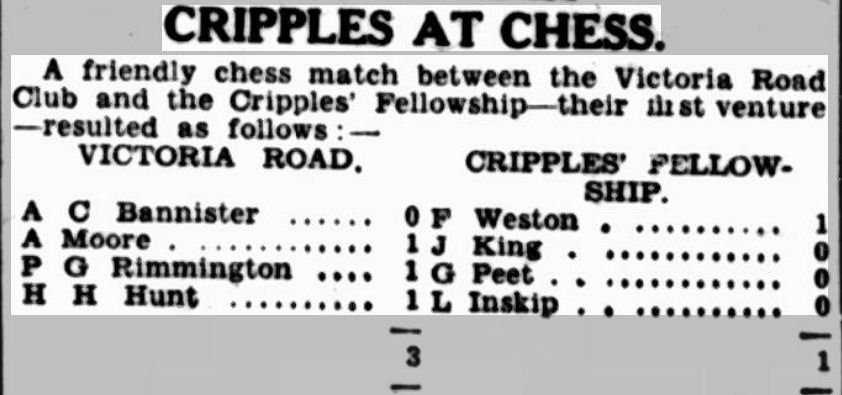
I haven’t been able to identify F Weston: there were quite a few gentlemen named Frank Weston or Frederick Weston living in Leicester at the time, none of whom had an obvious physical handicap. He had previously played for the Victoria Road club and was a fairly strong club and county player. It could be that he came along to help and support them, and perhaps provide some instruction.
His opponent here, Arthur Clement Bannister (1891-1982) was, in 1921, an engineer. His father James, who had been born in Earl Shilton, was the manager of a hosiery company. His sister Laura would later marry High Court Judge Sir Donald Hurst. James’s father and grandfather were both named Stephen. His grandfather was apparently born in Earl Shilton in about 1788 but I haven’t been able to find a parish baptism record. However, I know a lot about other Earl Shilton Bannisters, notably my great grandmother (mother’s mother’s mother) Louisa Bannister, who was born there in 1854. I can (speculatively) trace Louisa back to John Bannister, the son of David, born in Earl Shilton in 1714, which, if we’re both correct, makes me the 7th cousin of antique chess set dealer Luke Honey. It’s also a reasonable guess that Arthur Clement came from the same family, so we may share a common ancestor somewhere along the line.
I haven’t been able to find a record of another match until two years later.
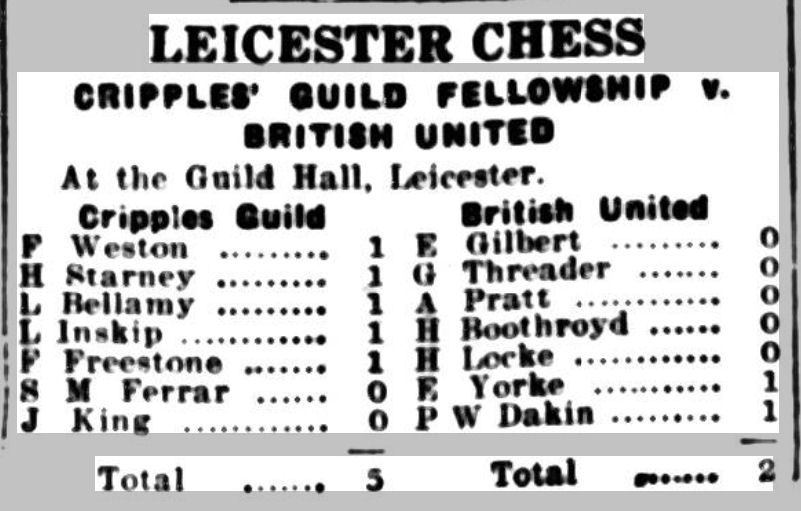
Some of the surnames there will be familiar to anyone researching Leicester genealogy. Names like Freestone, Gilbert, Pratt and Dakin come up over and over again.
Here we have a team of seven players scoring a convincing victory over British United, manufactures of shoe machinery and for many years one of Leicester’s biggest employers.
On board six was the Secretary of the Cripples Guild, Michael Stanley Woodward Ferrar, usually known simply as Stanley Ferrar.
Stanley was born in 1905 in Stamford, Lincolnshire, the youngest of three sons of Walter Ferrar and Annie Woodward. He also had a half-brother, Annie’s son George William Todd Woodward, who would change his surname to Ferrar.
At some point in the 1910s the family moved to Leicester, where Walter died in 1919. The 1921 census finds Annie and her three younger sons at 65 Beaumont Road Leicester. Reginald Walter is a motor driver and John Basil a baker, while Stanley, because of his disability, isn’t at school and has no occupation. George William (using his second name) is back in Lincolnshire, living in his brother-in-law’s pub, along with his wife Maud and their infant son, another Reginald. Like John Basil he’s employed as a baker.
In the autumn of 1933 they played several more friendly matches, and in 1934 applied to join the Leicestershire League, entering a team in the third (lowest) division.
They were pretty successful as well, as you’ll see from the final tables.
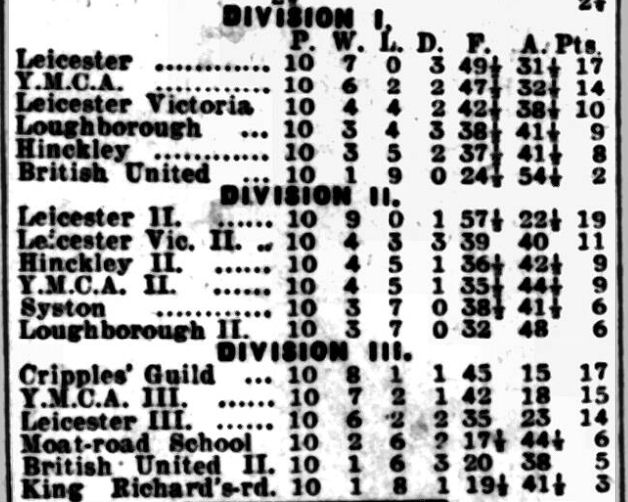
The following season saw them promoted to Division 2, while, with so much demand for places in competitive matches, they entered a second team in Division 3. Both teams performed respectably, as you’ll see from the final (there were a few unplayed matches) tables.
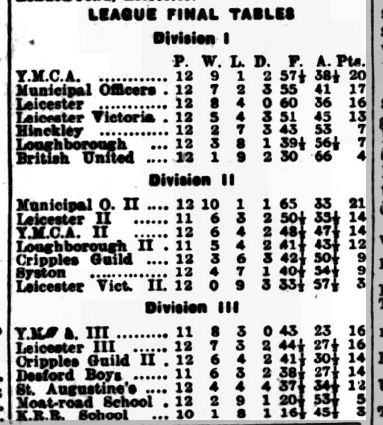
On 5 September Stanley Ferrar was selected as one of 40 players to take on the great Alexander Alekhine in a simultaneous display.
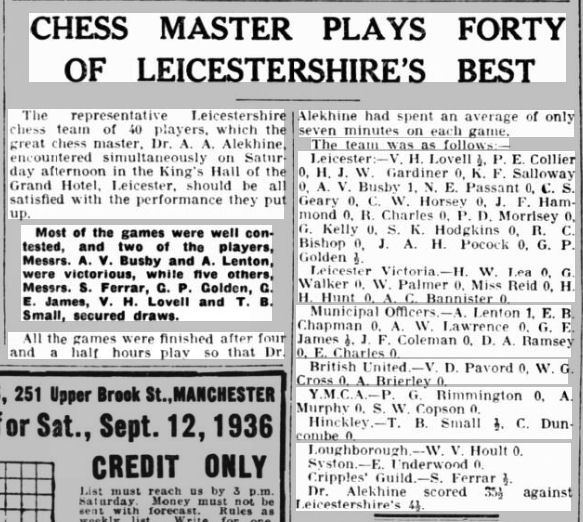 Leicester Evening Mail 07 September 1936
Leicester Evening Mail 07 September 1936
You’ll see that he drew his game, and, according to this report, was close to winning.
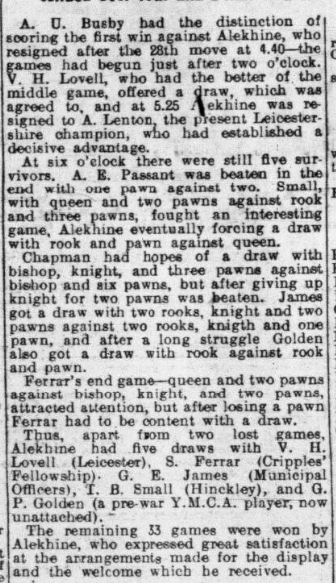
(There was some confusion about whether Mr Passant was the fairly well-known AE Passant or his lesser known brother NE Passant, who really should have switched the order of his first names.)
You’ll meet a few of Alekhine’s other opponents in later Minor Pieces.
The next season, though, they were struggling to raise full teams, so they needed some more manpower. Or rather girl power.
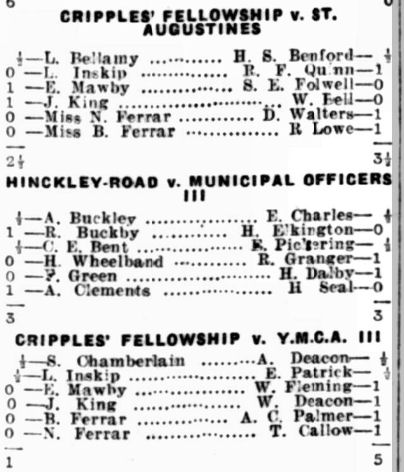
You’ll see that two Misses Ferrar have been recruited to their second team in Division 3.
These are Stanley’s nieces, Norma and Betty, who may well have been the second and third females to take part in the Leicestershire Chess League. You’ll meet their predecessor in a future Minor Piece.
Now there’s some confusion here as he had two nieces named Betty, both living in Leicester. His half-brother, George William’s children were, apart from Reginald whom you met in 1921, Norma (1922), Joan (1924), Betty (1926) and Monica (1928). His brother Reginald Walter’s children were Betty (1924), Neville (1926), Brian (1928), Rita (1931) and Brenda (1933). John Basil had no less than 11 children, but none of them fit it. (Leonard Inskip, married to the delightfully named Alice Lovely, also had a daughter called Betty who would later obtain a BA in Geography at Liverpool University. My mother would have told you how popular the name was in the 1920s.)
So Miss N Ferrar must have been Norma, and I suspect Miss B Ferrar was Reginald Walter’s daughter born in 1924 rather than Norma’s sister born in 1926. Both girls, then, would have been in their teens at the time of these matches. To the best of my knowledge, unlike Uncle Stanley, they were not themselves physically handicapped.
Norma didn’t play very long, but her sister Joan replaced her in the team.
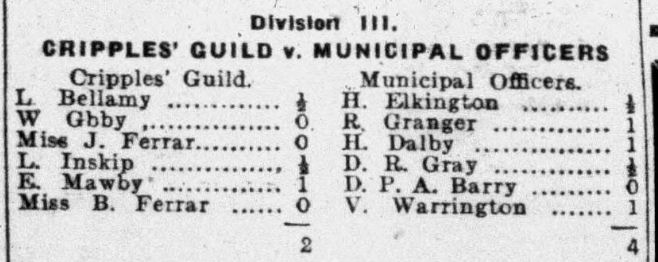
Leicestershire, a pioneering county in so many ways, had been running a boys’ championship for several years. In January 1938 Betty and Joan applied to take part in the Junior (U16 or thereabouts) section. Their entries were accepted, forcing the organisers to rename their competition as Juniors rather than Boys.
This report suggests that the event was rather chaotic and the standard of play not very high.
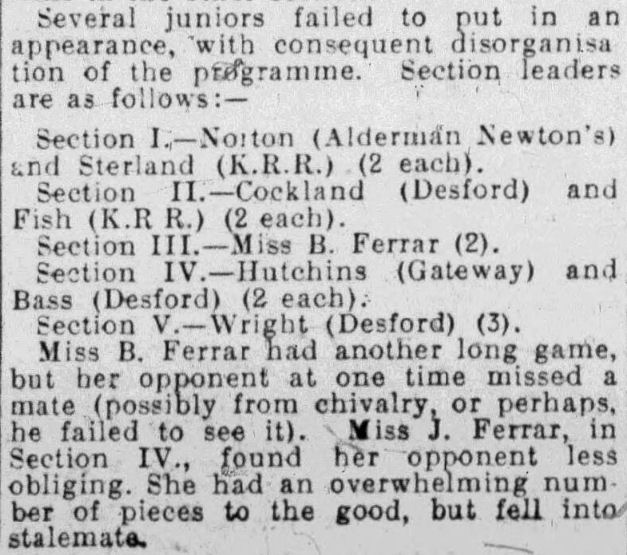
Betty not only won her section, but shared first place in the competition.
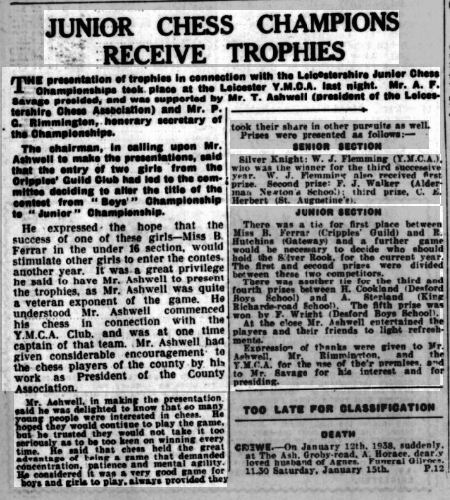
Here she is with her co-winner and the trophy.
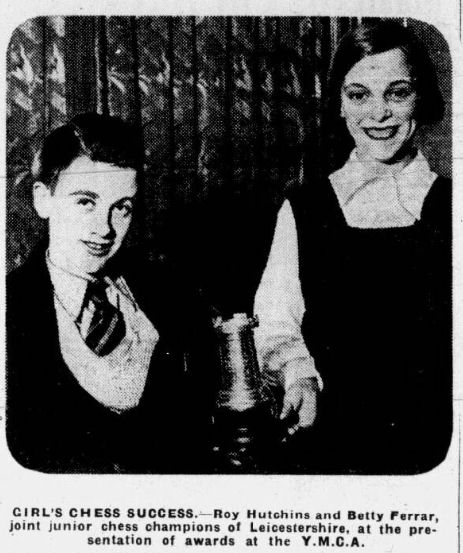
The Cripples Guild continued playing in the county league into the 1938-39 season, with Betty and Joan now in the first team, but then war put an end to their chess adventure. A wartime league was established, but they didn’t take part. That, then, is the end of the story. Stanley Ferrar married in 1945, had two children, Graham and Sheila, but died in 1951. Leonard Inskip died in 1955.
Leonard’s name lived on for many years in the Inskip League of Friendship for the Disabled: there were several branches of this charity, mostly, it seems, in Lancashire, some of which survived into the 21st century.
Leonard Inskip and Stanley Ferrar may not have been the world’s greatest players, but they represent to me what chess clubs are really about, providing friendship and community, especially for those who are, in one way or another, handicapped or disadvantaged. I’m sure their friends in the Cripples Guild gained a lot from their league matches and appreciated their efforts. Leonard was clearly a remarkable man, while Stanley, the stronger player of the two, by teaching and encouraging his nieces, became a pioneer and supporter of chess for girls.
Again, we see chess being used to provide competition for those who, through physical handicap or incapacitation, were unable to access physical sport. This wasn’t the only example of chess being used for social purposes. in the inter-war period. I recently came across a photograph of boys from a school for the deaf and dumb in Derby being taught chess. Most remarkable of all was the story of chess at Worcester College for the Blind, which I’ll perhaps explore some other time.
But, still in Leicester in the 1930s, there was another story being played out, promoting competitive chess for another disadvantaged sector of society. You’ll find out more in the next Minor Piece. Don’t miss it.
Sources and Acknowledgements:
ancestry.com
findmypast.com/British Newspaper Archives
Wikipedia
Google Maps
The Who’s Who of Radical Leicester (Ned Newitt)
Inskip One-Name Study
Mosaic 1898 website
Media Archive for Central England (MACE)

3 thoughts on “Minor Pieces 58: Leonard Inskip and Michael Stanley Woodward Ferrar”